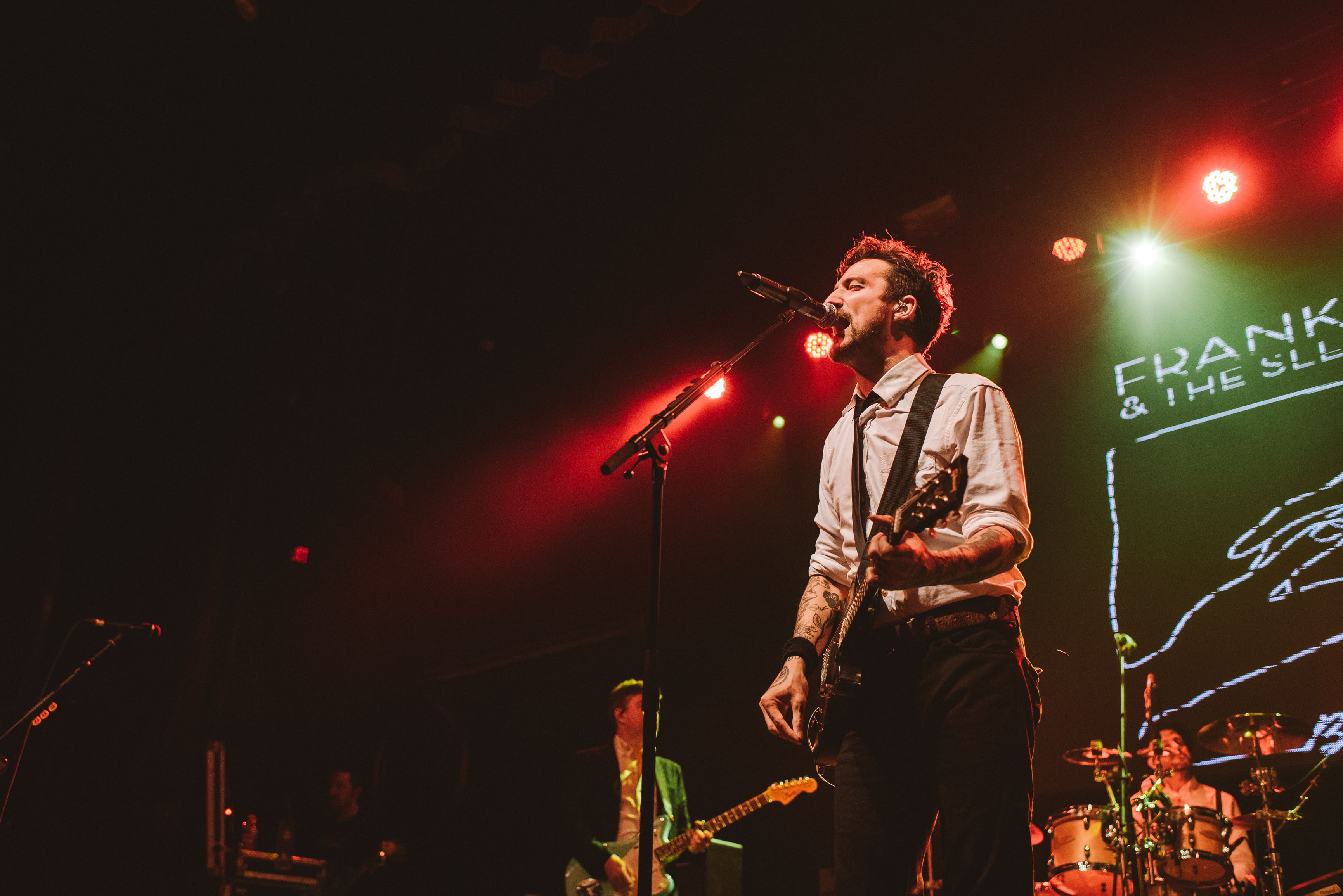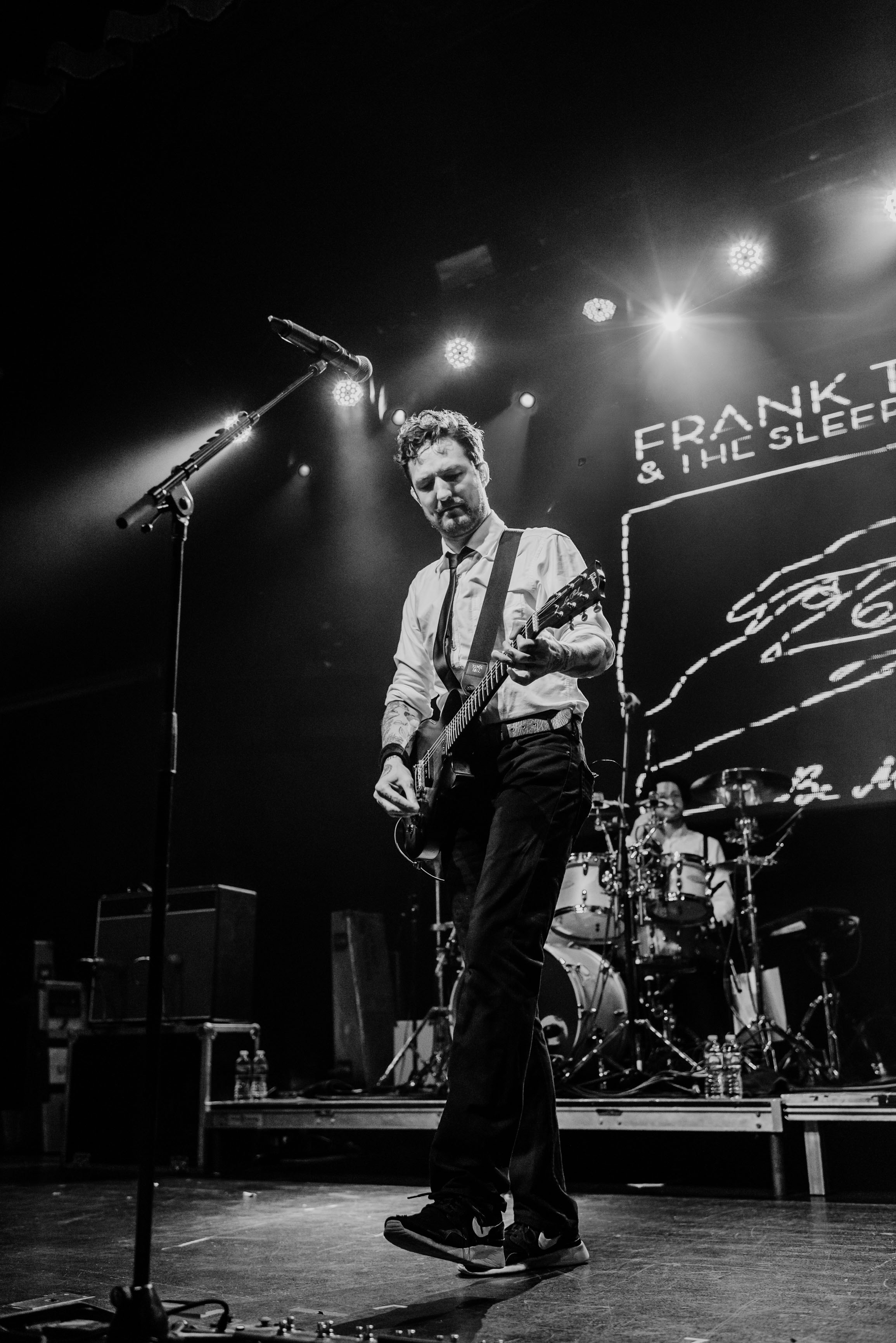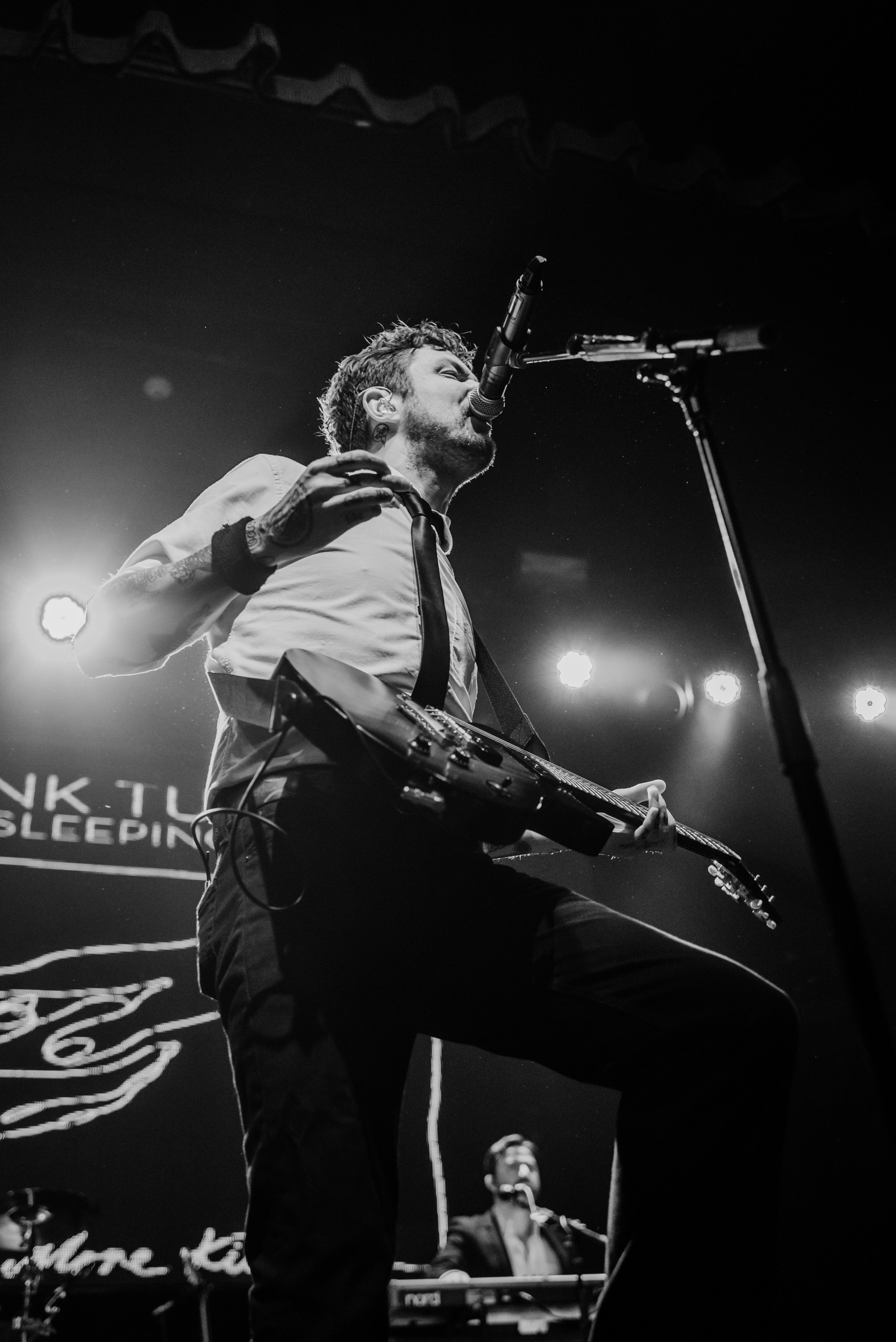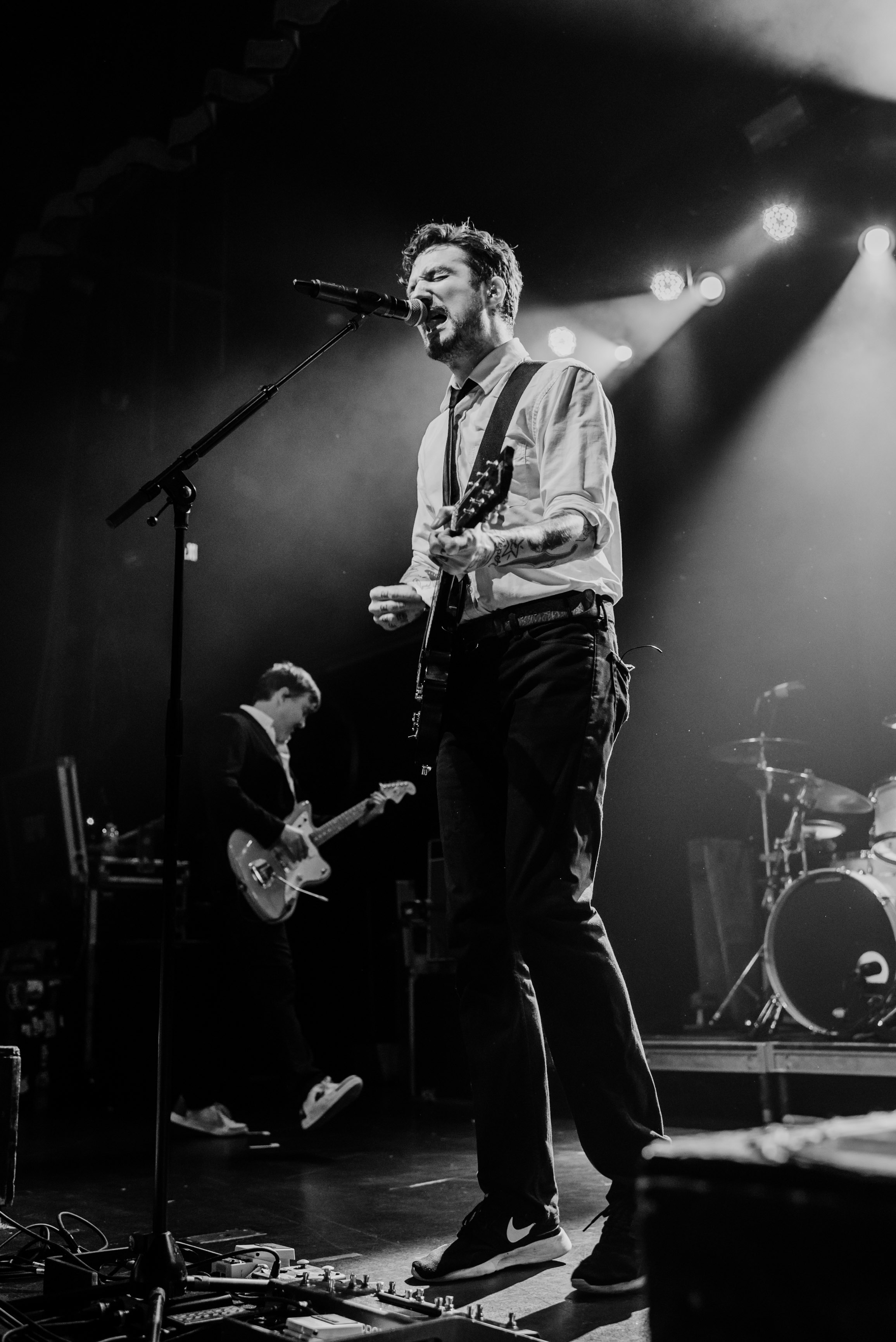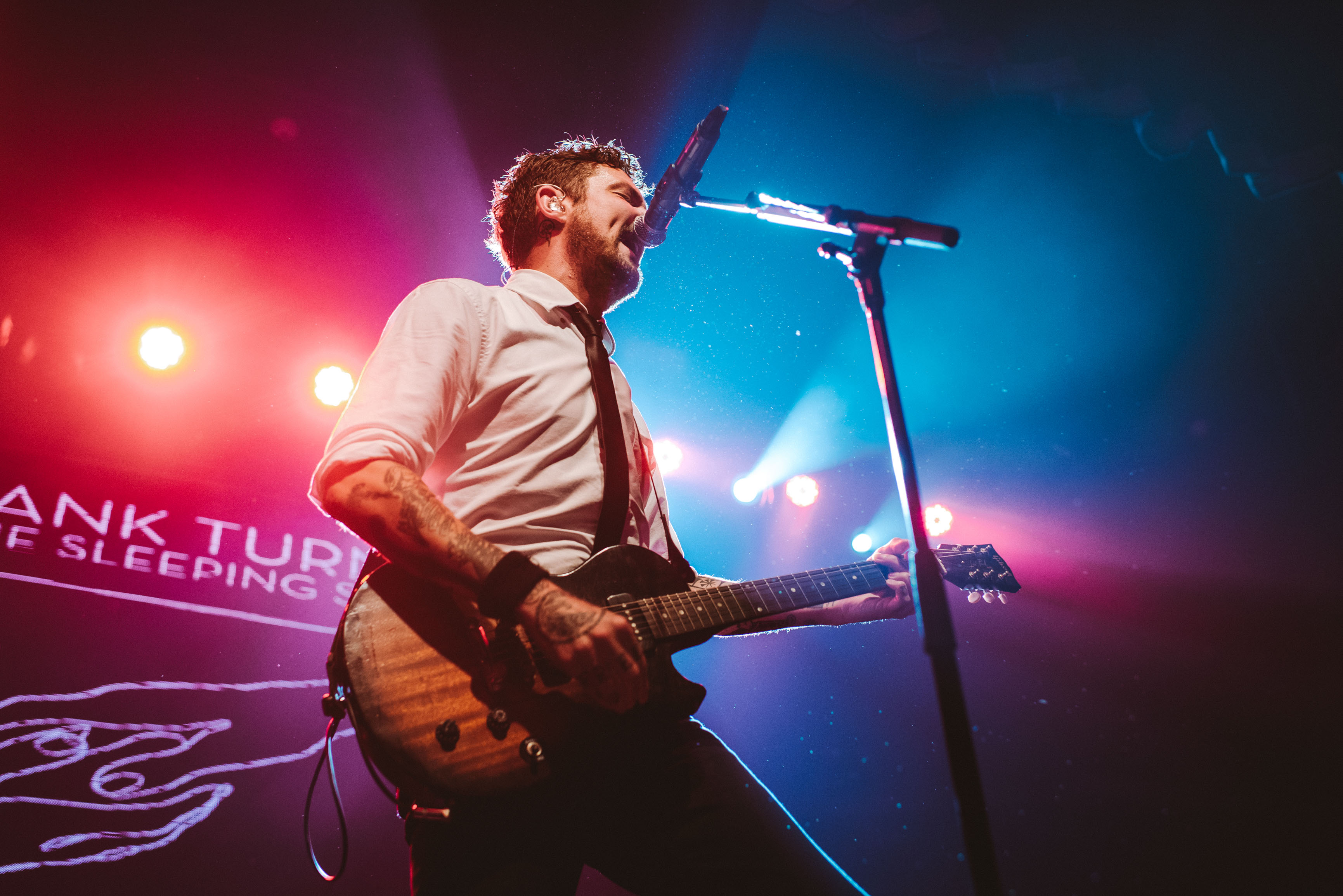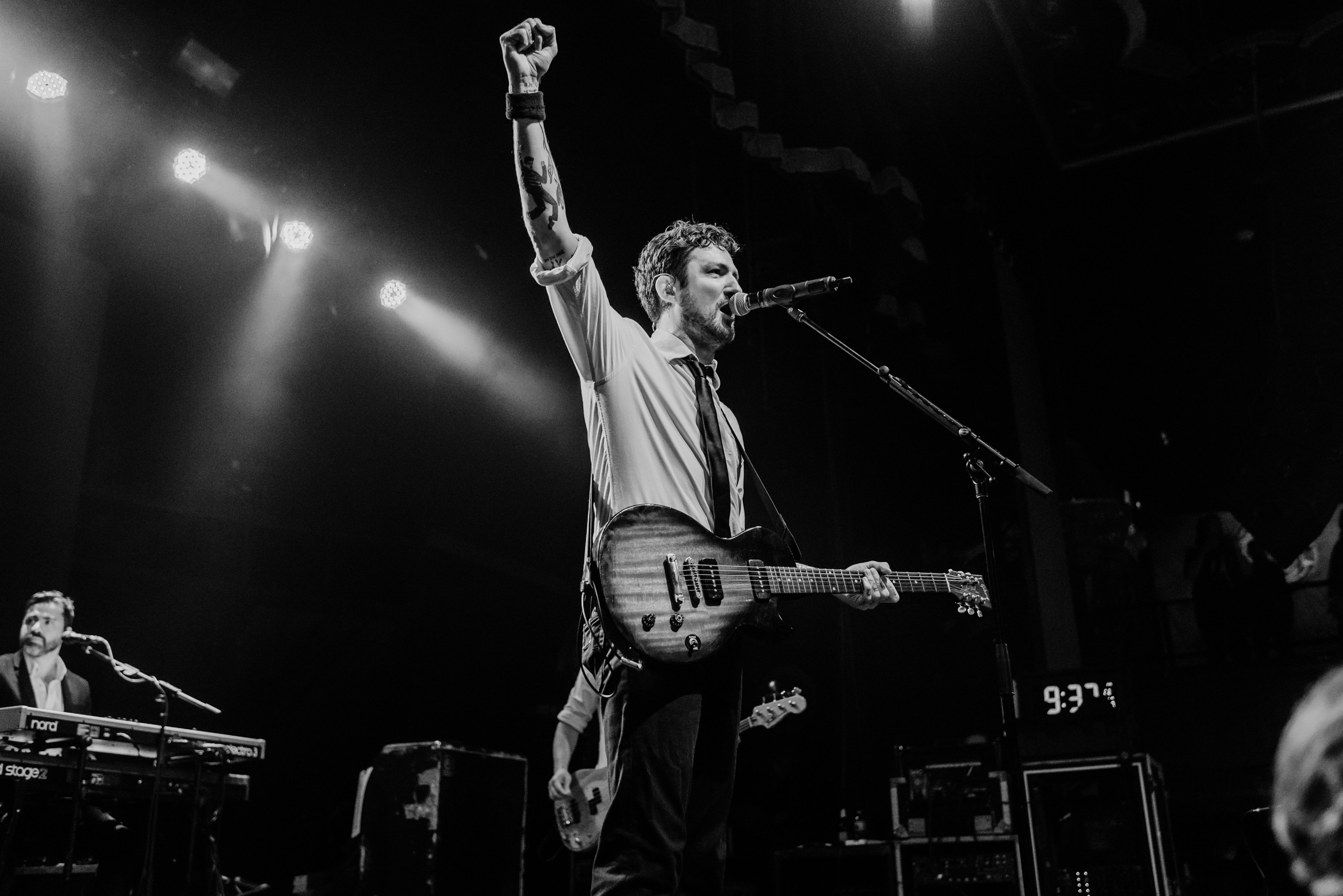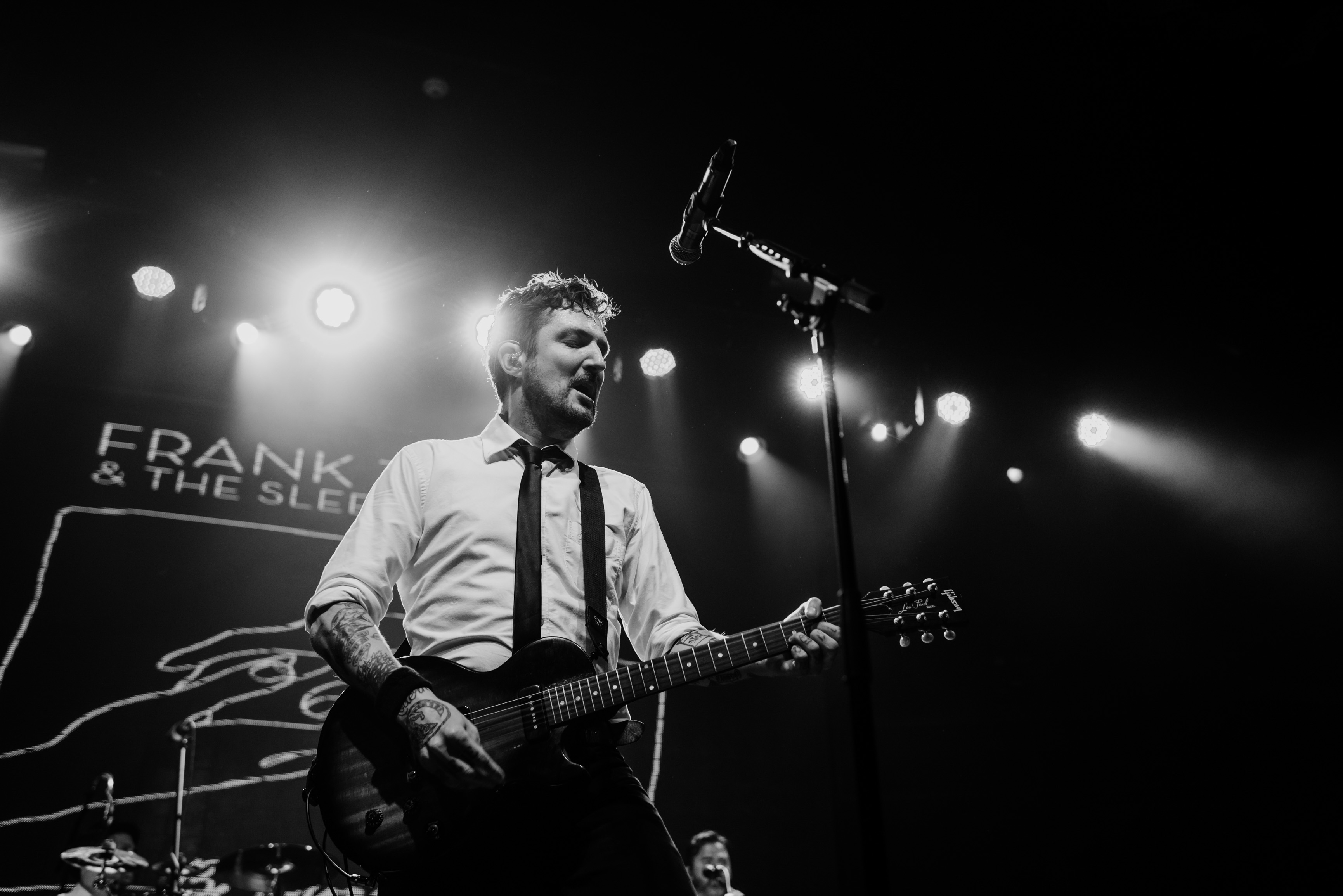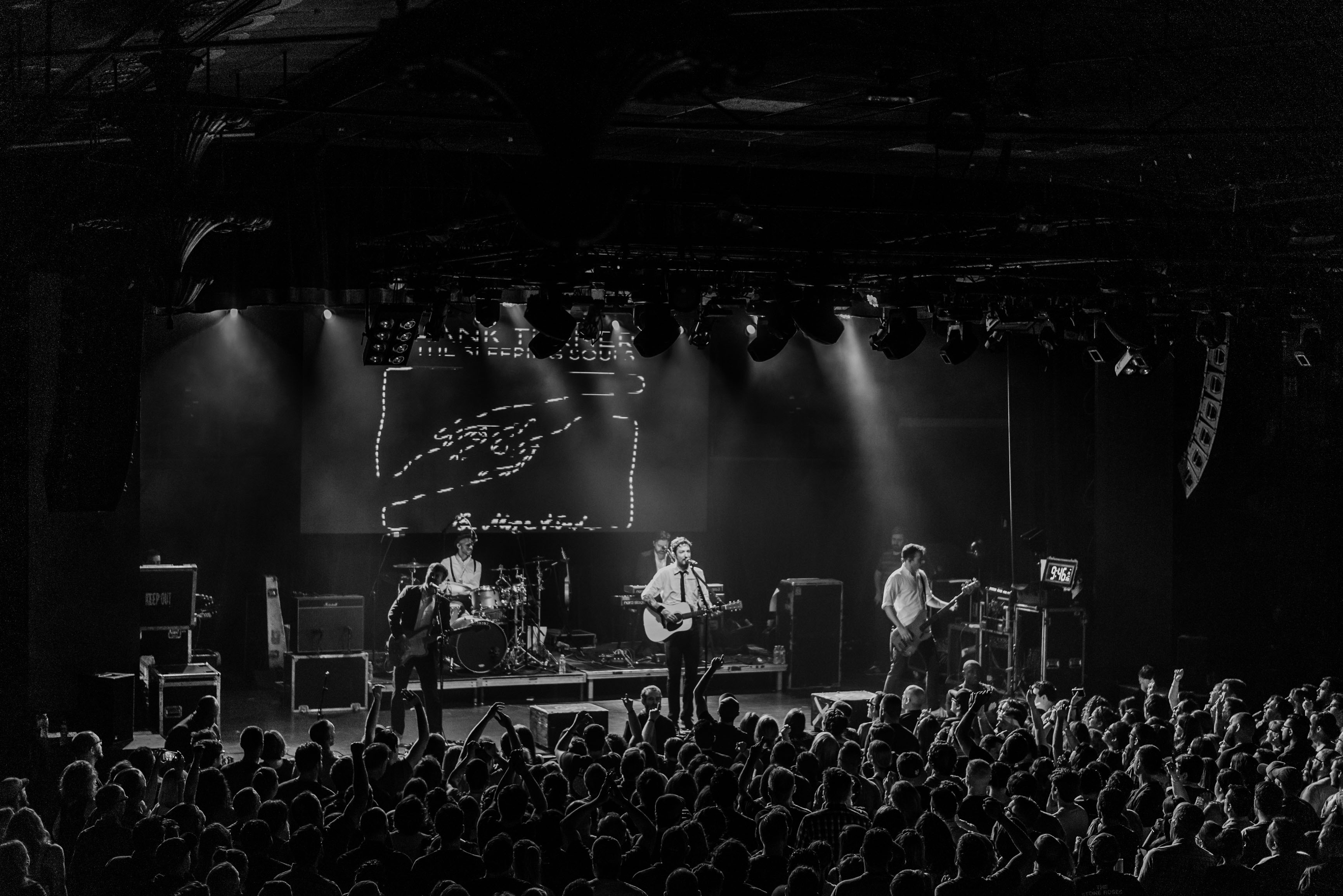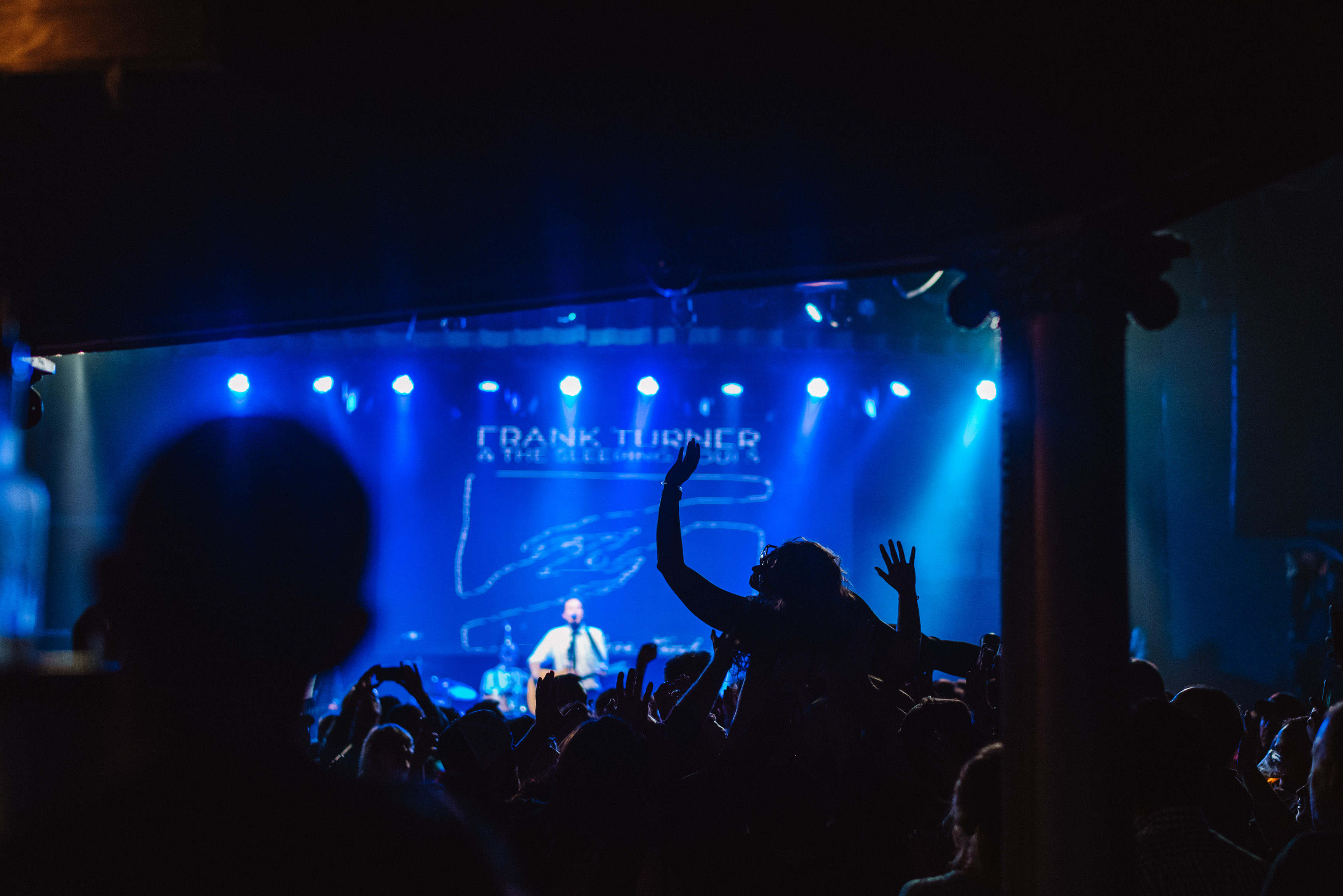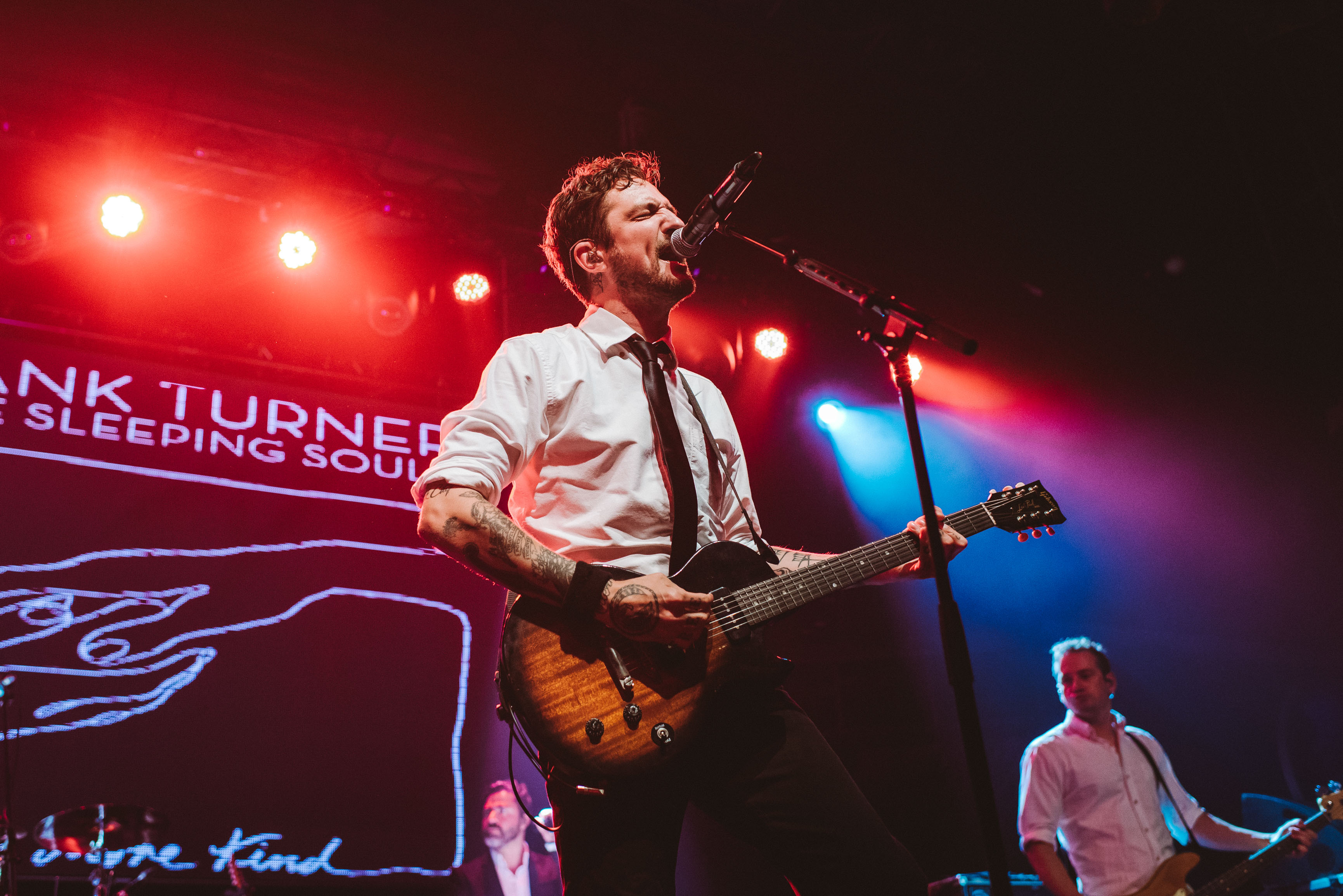
On Wednesday, Frank Turner and the Sleeping Souls opened up night two of a six show residency at the Royale with familiarity. While the world we live in today could give anyone trust issues, you can always trust that a Frank Turner show will be well crafted. You can trust that the crowd won’t slack on the call and response of “I Still Believe”, and that there’s no need to try and be cool while dancing in a room full of strangers. No hang ups, no pretenses, just two rules that Frank often shares during his shows:
1. Don’t be an asshole.
2. Don’t let the way you’re having a good time mess up someone else’s good time.
They’re good rules. They’re rules that you can trust.
Here at Allston Pudding, we’ve sent dads to festivals, had them review albums, and asked them to describe Sufjan Stevens. It’s about time we had a mom interview Frank Turner.
Frank’s music has always been a family affair for my mom, my sister and I; my mom first became a fan in 2013 when she saw him perform at the Newport Folk Festival. Quickly, she realized, “I need to see him perform whenever I can”. She passed her admiration for his music on to me, and eventually to my older sister, until all 3 of us finally made it to our first Frank Turner show together two years later.
My mom, my sister, and I get together once a month to hang out. For our outing this month, we decided to try something a little different. With my older sister behind the camera and with my mom asking the questions, we sat down with Frank last week to discuss his new album, Be More Kind, Duck Boats, and Bruce Springsteen.
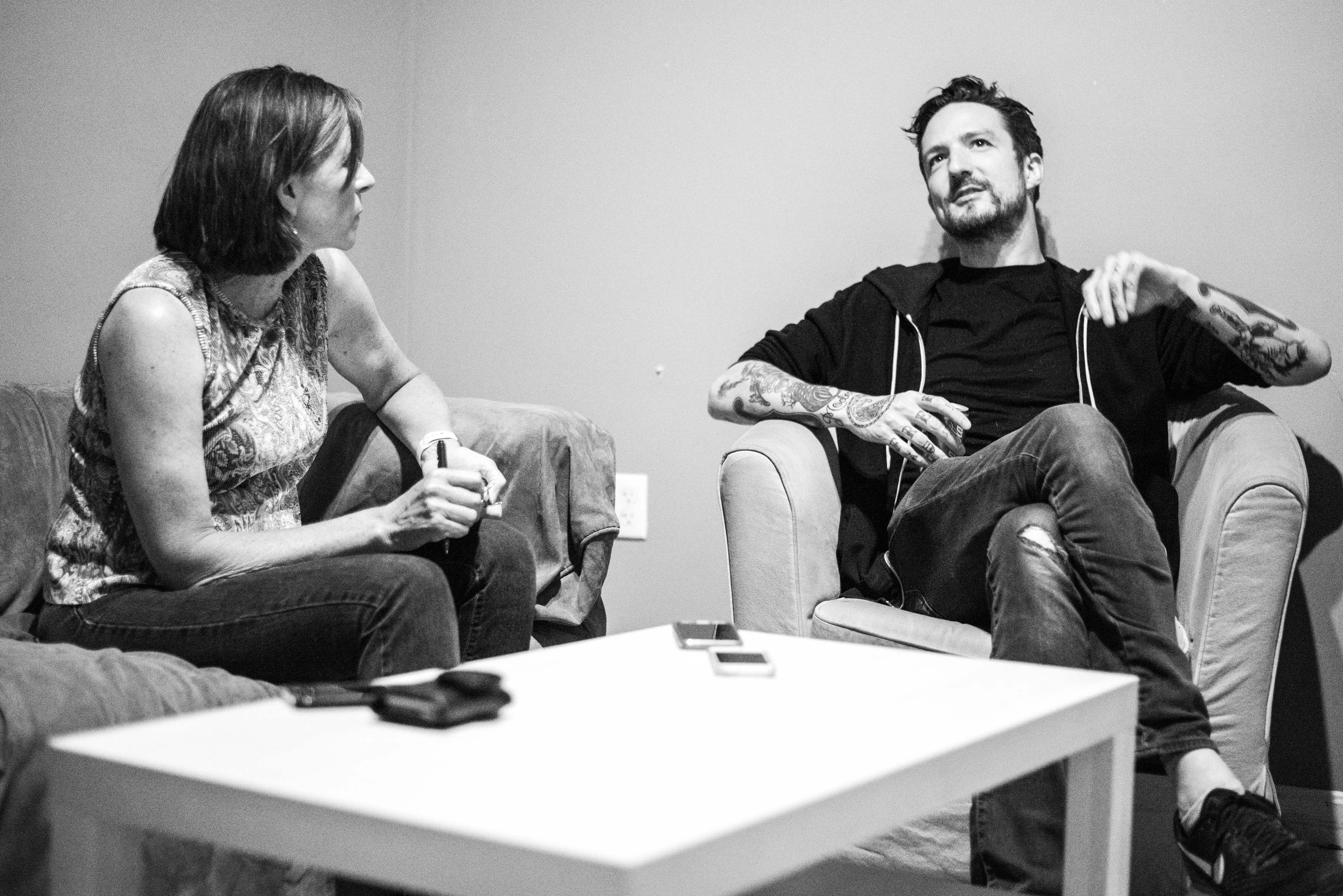
Mom: I wanted to ask you about Boston, because I’ve heard you say a couple of times that it’s like your adopted hometown. What do you like about it here?
Frank: Well, in some ways I feel like I should ask what it is Boston likes about me! Boston’s our biggest city over here. I think that originally, that had something to do with a radio station called WFNX. They had a kind of “closing-down” battle and they used one of my songs as their sort of “rally cry”, which was very flattering. And then, of course, we toured with the Dropkick Murphys, which is a little bit like being knighted in Boston. Do you know what I mean? It was sort of like given the seal of approval by the kings of the city. And, yeah, we’re here tonight; 18 months ago, whenever it was, we did Agannis. That was a fun show. And the thing is, coming back this time, it’s kind of like, well we could do Agannis again, or we could do something more interesting. And so here we are.
Mom: Have you ever done six straight shows in one city?
Frank: You know, I don’t think we have. I think the longest run we’ve ever done before is four. And I have to say that writing set lists for all of these nights is like…you know sometimes you have something on your to-do list that you don’t even want to look at it because it’s too hard to manage? So, I’ve got tonight. Last night we did the tour setlist, tonight’s done. Tomorrow’s gonna be a challenge, but we’ll get there. You know, it’s always difficult, because, there’s two constituencies that I’m thinking about. On the one hand, there’s the people, they’re going to see me once in two years, and then there are the people who’ve seen ten shows on this tour that we’ve just done, or indeed, have been to more than one night on this run. And it’s kind of difficult to please both, in a way. It’s kind of funny, because on the one hand, I think there are probably more of the former category, but the people in the last category are people who’ve dedicated a lot of time and indeed, money, to what I do, and I feel like they deserve some care and attention, you know? So, what I’m trying to say is I spend an unhealthy amount of my life thinking about set lists.
Mom: So, you’re here for a week and half: what are you going to do?
Frank: Well, it’s been really lovely for all of us, actually, because we’re settled in one place for the period of time, which is unusual for us on tour. We don’t tend to do that. So, we’re all “airbnb’ed”, and pretty much everyone’s significant other is joining at some point. My girlfriend’s here for the whole thing, which is lovely. So, we’re doing some tourist stuff; exploring the city a bit more. It’s funny, my misses said to me, like “well, I’m sure you’ve seen everything there is to see in Boston because you’ve been there so many times.” I’m like “I’ve seen the House of Blues, I’ve seen the Middle East in Cambridge, I’ve seen the Agannis Arena.” Do you know what I mean, it’s like, I’ve never done the Freedom Trail.
Mom: I never have either, and I’m 62, and I grew up close to here. But I was going to say you should take a Duck Boat tour.
Frank: Yeah, we passed one of those on the way to breakfast this morning and decided that we would do that.
Mom: So, “Be More Kind”…I wanted to tell you I appreciate the message.
Frank: Thank you.
Mom: I feel like “Here’s what we’re mad about; here’s how we’re gonna fix it”. It has a nice arc. I’m wondering how you find the quieter songs translate to the whole live experience?
Frank: That is an interesting question. I find that familiarity helps. Do you know what I mean? So when the record first came out, or indeed before it came out, those were more difficult songs to put in. At the same time, I feel quite strongly that like, one of the things…one of my foibles in life, is that I have a bit of a part in my brain that associates screaming and mosh pits with success in terms of a live show. And that’s not always true, because if you can make a room full of 1500 people stand in silence and pay attention to a song, that’s also a wonderful, magical moment in the show. And it’s just the inner hard-core kid in me that, if there’s bodies flying and lots of noise, I’m like “It’s going well!”, and if there isn’t, I’m like “We’re doing something wrong!”. And that’s actually not a particularly holistic way of thinking about an audience and how they’re receiving a show. So I do try to bear that in mind. It’s funny, like we played “The Lifeboat” for the first time live a couple of nights ago, and it was pindrop…it was in Cleveland, it was pindrop silent in the room, and that was a really special thing, actually, because that’s like, one of the more ambitious songs that I’ve written in recent years, and I feel it’s an important song for me and it was nice to see it well-received. I don’t really know how many people knew the song, but even if you do know the song, it’s not really a sing-along. Do you know what I mean? It’s not really a song where you take your top off and go “Rrrrrrrrr!”in the choruses. So, yeah, it was a good reaction.
Mom: So when they asked if I wanted to interview you, what I really wanted to ask you about was the whole political thing. Because, we were at the Agannis Arena show, and you opened with “Sand in the Gears” which was perfect and just so cathartic. When we got this whole administration, I thought “Well, at least we’re gonna get some good art out of it”, but then I feel like, yeah, not so much, except for you. Do you think this is a genre? Do you think we’ll look back and other people will dive in? I mean, you have “1933” and “Make America Great Again”.
Frank: Yeah, I do. I mean, it’s funny, like, I feel, I have historically shied away from the word “protest singer” because it seems quite limited to me. I’m totally fine with that being an element of what I do, but, you know, to just be a protest singer seems a little kind of one-dimensional to me. Not least, I also think it’s important to know that the notion of being a protest singer is not, has no inherent moral content, because it entirely depends what it is you’re protesting against. And I have to say, that like, some of my friends who are more politically-active songwriters, haven’t really been able to change gear in their writing since Trump got elected because they were just as angry under the last administration and therefore, it’s a bit, kind of like—so, what’s the difference then? By that schedule, it’s all the fucking same, which I don’t think is true.
Part of the reason I haven’t been writing political songs, there are a number of reasons, but one of them is that I didn’t feel there was anything particular that wound me up enough to put pen to paper about it, do you know what I mean? Of course, there are always issues and disagreements, shortcomings and things we can improve on in society, but I think that between 1990 and 2016, we did a reasonable job in the West in living in peaceful, prosperous, liberal societies that were moving in the right direction. At the same time, I think one of the things that’s important for me to say about the new record, and let me get to the end of this point, is that in some ways, in some places, it was an attempt to write a non-partisan political record. Which I know sounds inherently contradictory, but I think the point for me is that it’s a record about how we interact with each other as individuals in times, in divided times. It was really important to me that somebody, not necessarily somebody that’s wearing the fucking hat, or marching in Charlottesville, but somebody who, for whatever respectable and local reasons, voted for Trump in 2016, could listen to the record and not feel like they were being attacked. Because I don’t necessarily see the point in that. Obviously, that’s not true all the way through the record; there are some moments where I put my money down, and to say that I want to have a non-partisan argument about how we conduct our discussions, doesn’t mean that I don’t have a position in said arguments when we get to them. But it’s just, I am so bored of people taking pride in finding their opponents unintelligible. That’s a sign of ignorance to me. Do you know what I mean with the “Ideological Turing Test”? If you can’t do a decent impression of the arguments that you disagree with, then you don’t understand the arguments you disagree with, and therefore, you need to think about them more.
Mom: Well, it’s that thing about having a conversation.
Frank: Yeah, completely, and it’s a thing that we used to be better at as a society, or at least in my lifetime we did. We can talk about the ’60s as well, of course, is another time of deep division certainly in American politics. But, yeah, people are kind of like, “Fuck anyone who I disagree with” and it’s kind of like, well, that’s just a waste of their breath. And also, if you, I mean, I think that thing recently with that Congresswoman saying that they should like hound administration officials is kind of like “Cool, the next time that anyone starts hounding you, you have zero fucking legs to stand on.” Do you know what I mean? And that, incidentally, is liberalism 101. I mean, it’s the most basic part of being a small “l” classic liberal, or whatever, and it’s sort of terrifying to me that so many people in our society have, as we’re now finding out, forgotten that, or indeed, were never taught it in the first place.
Mom: And I don’t think, not that this is about me, but I don’t think, I don’t ever remember it being this bad. I don’t ever remember things being so polarized. So, you have a lot in this album about, you know, building a bridge. Which in my mind, I also hear “and not a wall”, you know. Reaching out and being more kind.
Frank: Yeah, absolutely. But it’s funny, the thing that I’ve, I think I knew anyway, but that I’ve discovered, in the space since this record came out, is that everybody’s in favor of being more kind if it involves their opponents being nice to them. Do you know what I mean? And it’s like, that’s the easy part. The harder part is trying to find some common ground. Like I said to somebody; I shouldn’t get involved in Twitter arguments—it’s a waste of my life; but someone was just kind of like “You say ‘common ground’, but there was literally nothing in common between me and the Tory administration in charge of Britain”, and I thought to myself “That’s just epistemologically not true.” If you sat in a room with Theresa May, who incidentally, I think, is a poorly useless sack of arseholes, but you could find things to agree on. I think you would both agree that, like, and open…you know just basic shit. And like, to sit there and stamp your feet and kind of go “There’s no possible world in which one sentence could pass their lips that I agree with” is just kind of like “You sound like a a child about other things”.
Mom: I saw a picture of you with a Springsteen on Broadway t-shirt. Did you see the show?
Frank: No, I didn’t. Someone went, bought a t-shirt and sent it to me, which I thought was delightful.
Mom: Oh, it’s a wonderful show. I have seen Bruce a lot, and your performing style, to me, is so much like his.
Frank: That’s a huge compliment. Thank you.
Mom: Have you seen him play a lot?
Frank: I’ve seen him five times, I think. He is, and I will… not even confess, I’m not going to use the word “confess”… I try to study my art form, and I have spent a lot of time watching Springsteen live videos and trying to examine his craft.
Mom: That’s exactly what I wondered, because you got it. The thing that I don’t think even think you can get from a video that I see, is that you have that connection with the audience. Bruce has that. Not many people do, and to me, that’s what always made me…I first saw him right across the street; 1975. But that’s what always got me coming back, and the same with you. It’s like, that’s why I wasn’t too nervous about coming here…we did watch your documentary; I know this is like an issue—everyone feels like they know you. You connect, and that’s like a double-edged sword, I imagine.
Frank: It can be, but it’s passing, and it’s occasional. I’m a gregarious person, generally, do you know what I mean? I’d rather feel sort of connected to somebody that not. But, yeah, just every now and again. Like, one of the things I actually had this out with somebody, not had it out, had a discussion over email, something about this, this morning. In fact, it’s like “Oh, well, I’m pissed off I didn’t meet you after the show last night.” And it’s like, we don’t do paid meet and greets, because I’m not going to commodify my social time. That’s bullshit. But also, I like meeting people; I don’t want to be removed from my audience. But like last night, I finished the show, I was tired, I was hanging out with my girlfriend, and as far as I’m concerned, the minute I’m off stage I’m a normal person and the same rules apply to me as apply to anybody else. And if I have a night where I feel like going to bed, I’m fucking going to bed.
Mom: One last thing. I am a cancer survivor, and I had a stem cell transplant; I sometimes volunteer with Love, Hope, Strength, so I just wanted to thank you for the connection. You’ve signed up a lot of people at shows.
Frank: Fantastic. That’s great. I’m very glad to hear that. Rob and his crew who run that are amazing people. All of that kind of thing is like, it is so…I kind of don’t want any plaudits for having charitable organizations at our show. It takes 30 seconds of my day and it takes about 2 minutes of my tour manager’s day, to set up a table.
Mom: Yeah, but not that many people do it, and…
Frank: Well, they fucking should…
Mom: Well, it’s a good connection and I’m sure it did people some good, so…
Frank: Good. Yeah, you know, it’s more important than rock and roll, so …
Mom: You think so? I don’t know. It’s kind of a toss-up sometimes. (Frank laughs) Well, that’s it. Thank you. It was so nice to meet you. I’ll see you tonight at the show.
Limited tickets still available for the final night of Frank’s 6 night residency (Monday July 2nd w/ Kevin Devine & The Goddamn Band and Trapper Schoepp): HERE.
